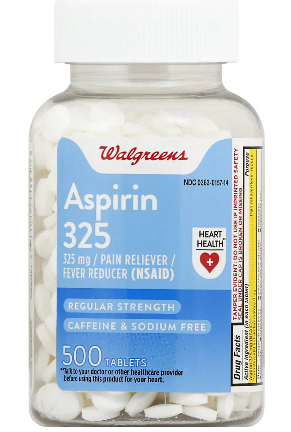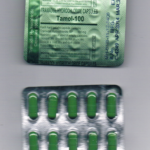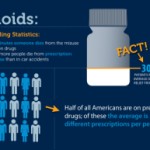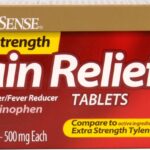Not feeling well? Are you having problems getting up in the morning because of the aches and pains that you go through every day? You do not have to worry anymore since you can buy Aspirin to help lessen your pain and soreness. The medicine is utilized to deal with your mild to fair twinges of pain. Aspirin helps take away your high fever. This kind of medication is really important in treating heart attacks, heart strokes and chest pains. Just keep in mind that when using Aspirin for heart conditions it should be upon the advised and watchful eyes of your specialist.

You can buy Aspirin over-the-counter and has been the most effective anti-swelling, fever reducing and pain relieving medication for more than a hundred years. Aspirin contains acetylsalicylic acid that prevents certain chemical substances inside your body from causing pain and swelling as a result of headaches, fever or injury. These chemical substances are known as prostaglandins. When you take in Aspirin it helps reduce your body’s reaction to pains.
To get rid of redness and soreness, buy Aspirin. There are proofs to show that prostaglandins are also present inside the swollen parts of your body. With the use of the medication, Aspirin stops the creation of prostaglandins therefore reducing the inflammation and relieving you of the discomfort that comes along with the distended tissues.
Not only can this medicine be a great help in alleviating your distress, you buy Aspirin because it can also save your life. The Food and Drug Administration has approved this wonder drug for the treatment of heart attacks or potential heart attacks. Using half of the tablet or an equivalent of 160 to 162.5 mg of the regular Aspirin pill minimizes your risk of dying from a possible heart attack. The medication is to be taken for 30 days under the watchful eyes of your physician.
If you have had a heart attack or suffered from chest pains, chances are you will be susceptible to another one. A daily intake of Aspirin helps reduce the threat of another heart attack. The tablet also prevents heart stroke from putting your health in jeopardy. Heart attacks and strokes that continually occur, the FDA require that a low dose of aspirin be given to patients under the care of their specialists. Generally 75 to 325 mg is needed for periodic heart attack and repeated ischemic heart the dose is usually 50 to 325 mg. Self-medication is not advisable. Everything must be done through consultation and guidance of your doctor. The low dosage is necessary because it prevents blood from clotting.
There are several kinds of Aspirin available in drugstores locally and online. The medicine also comes in various strengths. Your doctor is the best person to prescribe the exact strength and dose for your condition and health. What matters most is that you follow your general practitioner’s directives. Do not take more than what is recommended. To stop heart attacks, lead a healthy lifestyle, too.
If you get more information about Canadian pharmacy please visit Buy Aspirin and Aspirin Coat Tablets. All orders are dispensed by a fully licensed pharmacy and shipped directly to your doorstep.
Aspirin is a lifesaver
Imagine that after years of painstaking research, scientists announced the development of a breakthrough treatment that costs pennies a pill, saves lives, and could reduce healthcare spending by nearly $700 billion in the coming years. And you wouldn’t even need a prescription to get it. Perhaps this all sounds too good to be true. But, according to a new study, we already have such a drug: it’s called aspirin.
An analysis of aspirin use
Based on current recommendations, only about 40% of people who should be taking aspirin are doing so. In this new report, researchers asked: what might happen to population health, longevity, and healthcare costs if aspirin use were more widespread? To answer this, they analyzed reams of health data from thousands of patients and estimated the impact of more widespread aspirin use on their health and survival.
Their findings were striking. For people in the U.S. ages 51 to 79, routine aspirin use could, over a 20-year period:
- prevent 11 cases of heart disease for every 1,000 persons
- prevent four cases of cancer for every 1,000 persons
- lengthen national life expectancy by about four months, allowing an extra 900,000 people to be alive in 2036
- save $692 billion.
Is there a downside to aspirin?
As is true for all medications, aspirin has its downsides. Among other side effects, allergic reactions may occur. And, aspirin is a blood thinner and can irritate the stomach. Episodes of bleeding and stomach ulcers can be serious. So, the researchers took these into account; the estimates above include these side effects of taking aspirin.
It’s important to emphasize that this study assessed the impact of low-dose aspirin, such as the 85 mg daily dose often found in baby aspirin; higher doses may be recommended for other conditions (and come with added risk). In addition, aspirin can interact with other medications. For example, if you take low-dose aspirin for your heart and ibuprofen for arthritis, it’s important that the ibuprofen be taken at least 30 minutes after or more than eight hours before the aspirin; otherwise, the benefit of the aspirin may be lost.
Who should take aspirin?
For those at highest risk of future cardiovascular problems, including those who have had a prior heart attack or stroke, aspirin is routinely recommended to reduce recurrence.
For everyone else, recommendations vary. Some experts recommend low-dose aspirin for everyone over age 50. Other guidelines make a more conservative recommendation based on age (e.g., 50–79 years old) and cardiovascular risk factors that predict a heart attack or stroke occurring in the next 10 years. Well-studied risk calculators, such as the one developed by the Framingham Heart Study, are available to estimate 10-year risk.
In addition, aspirin is routinely recommended to lower cancer risk in people with certain genetic conditions, including hereditary nonpolyposis colorectal cancer.
Why don’t more people take aspirin?
It’s not entirely clear why many people forego aspirin use. My guess is that it’s a combination of factors, including:
- a lack of awareness that aspirin is recommended
- it wasn’t specifically recommended by their doctor
- a greater concern about side effects from aspirin than its potential benefits
- a previous bad experience with aspirin use, such as an allergic reaction
- an aversion to medications in general.
It’s worth emphasizing that when it comes to any treatment — and especially preventive treatments — individual preferences matter a lot. As a result, many reasonable people who would be good candidates to benefit from aspirin will choose not to take it.
What does this mean for you?
For all the effort to identify new and better drugs, it’s remarkable that we aren’t taking full advantage of what we already have. This new study suggests that large health benefits are not being realized simply because not enough people are taking aspirin. But each person has his or her own set of circumstances that can affect the both the risks and the benefits of aspirin treatment, as well as his or her own preferences. The decision to take or forego aspirin is a big one — so add this to your list of things to discuss at your next appointment with your doctor.
Pain Medications, Pain Relief, and Pain Management






